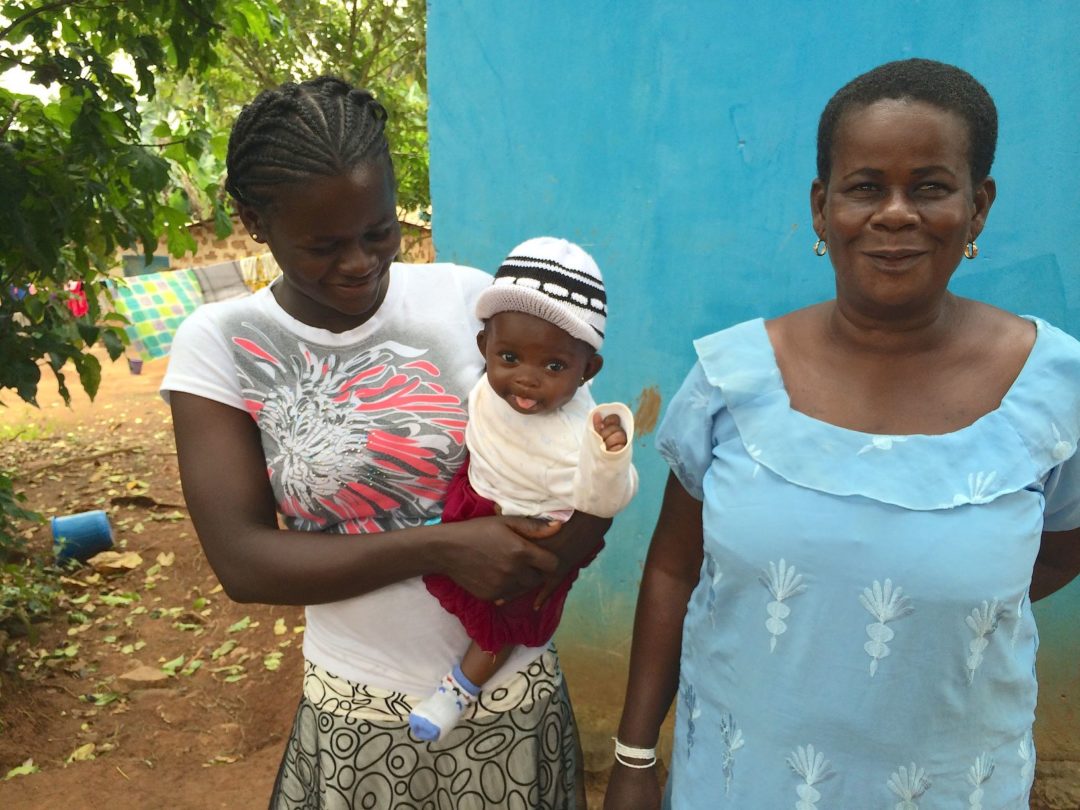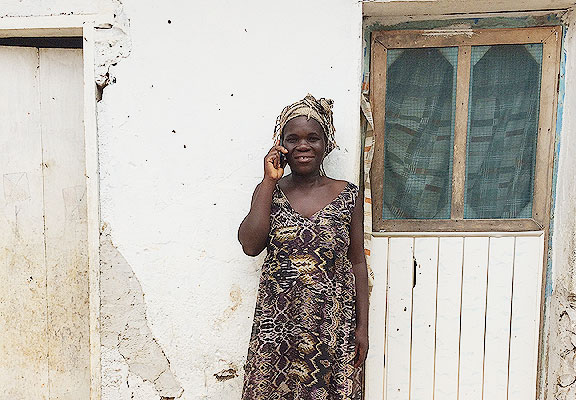Mobile-Midwife Technology Delivers Health to Moms in West Africa
Categorized as: Africa, Girls & women, Grantee, Our Partners, Poverty Alleviation, Stories & Tagged as: Ghana, Grameen Foundation, Maternal healthcare, Mobile Midwife, Mobile technology, Women's eNews on September 6, 2014.

One mobile phone app delivers time-sensitive text messages or voicemails to pregnant women and new mothers; the other is for nurses. Together they are doing wonders for maternal and pregnancy health care and raising community awareness at the same time.
This story originally appeared on Women’s eNews.
 Cecelia Annan calls in to check her prenatal symptoms in Nkoranza village, Ghana.
Cecelia Annan calls in to check her prenatal symptoms in Nkoranza village, Ghana.
NKORANZA VILLAGE, Ghana — Thirty-two-year-old Cecelia Annan wouldn’t say she has an easy life; but she does have an easy pregnancy.
“In my previous two pregnancies, I felt sick and weak all the time,” she says, shaking her head at her family’s compound, with its wood-fired kitchen and mud-brick huts. “Before, I would drink alcohol and I took enemas.” Her visiting nurse shows me the herb used for traditional medicine enemas thought to relieve cramping. She explains that they actually cause internal bleeding and miscarriage.
Now, Annan knows better. “I’ve had a lot of information from Mobile Midwife,” she remarks. “Now I know what time to go to the clinic for my appointments and immunizations, and that I should go to the clinic when I am sick.”
Eight months along, Annan plans to deliver in a clinic and she’s already made arrangements with a local taxi service. “Now I eat fruit and vegetables, even if it’s with a little [starchy] fufu,” she says. “I feel stronger and more energetic than even before I was pregnant.”
Married to Joseph, a cocoa farmer forced to live away and who can only visit home once a month, Annan says, “Life is difficult for me. I have to take care of our two sons, ages 3 and 8, alone.” What little work she gets as a tailor often goes unpaid: “Half of them—or more—do not pay.” Yet she believes that because of better health care, this upcoming birth will be “easy.”
The Mobile Midwife program, developed by a collaboration between the Washington-based nonprofit Grameen Foundation and the local government’s Ghana Health Service, provides two mobile phone apps: The Mobile Midwife app delivers time-sensitive text messages or voicemails to pregnant women and new mothers, reminding them about upcoming appointments, informing them about what symptoms to expect and sharing self-care tips on nutrition and hygiene. The other app, the Client Data app, allows nurses to upload patient records into a centralized database to track client care.
Expanding the Program Across the Country
Now reaching 37,000 patients in six districts in Ghana, Mobile Midwife is part of MOTECH (Mobile Technology for Community Health), a suite of health care services that address a range of issues such as malaria, HIV/AIDS and tuberculosis. It will soon be launching in Nigeria.
Joining the Mobile Midwife program is free to low-income moms such as Annan. It costs Grameen Foundation and its partners $12 a year per woman to deliver equipment, airtime and immunizations. Pregnant mothers receive a three-part anti-malaria medication to protect babies, and infants receive all standard immunizations and well-baby care for the first year of life. For any concerns they may have, mothers have access to a 24-hour-a-day nurse.
Why cell phones? Of the 7 billion people on earth, an estimated 6 billion have access to a mobile phone. Cell phones are incredibly common, even in the most rural areas, where more people have phones than toilets.
Wherever I go in Ghana, as I travel with Grameen Foundation to gather impact stories, the mothers of Mobile Midwife tell me that they love the program. They feel a spike in their social status. They get voicemail appointment reminders translated into their language, in conditions where there is no paper calendar or computer in their huts and no ability to read a calendar or text message, as many of these moms have not had the chance to attend school and are illiterate.
Because the messages come through over a mobile phone, they have had some surprising outcomes: Neighbors want to hear messages and husbands are listening alongside. “There’s been an increased male involvement with pregnancies,” Awutu Senya district director Patricia Antwi told me. Additionally, “30 percent [of women] are now seen by private doctors, and we’ve seen a sharp decline in stillbirths and mastrated births.” Mastrated births are those in which the fetus has died in utero during a miscarriage and has begun to decay.
Secure Funding Needed to Get the Program Off the Ground
What worries Antwi now is how to secure funding to continue running the program once philanthropic dollars expire in December. Grameen Foundation is testing a sliding-scale fee that will use revenues from middle-class women (who say they are eager to utilize Mobile Midwife) to support poor women, long after startup grants have ended–thus transforming itself into a sustainable social enterprise.
“What we need are more services,” Antwi says, “reliable transportation, free antenatal care and a more reliable network to convey Mobile Midwife messages and patient data.” Her district has transitioned nurses to tablet devices for easier for data management.
People believe the medical information, even when it conflicts with ancient indigenous beliefs. I spoke with several traditional midwives who’ve also changed their views. They no longer believe, for example, that a visitor seeing a pregnant mom or new baby will “cast an evil eye” to harm the baby or that prenatal anemia can be cured with a mixture of tomato paste and Coca-Cola.
Traditional birth attendants used to help with the birthing process, but their job has been outlawed since 2008, when the Ghanaian government installed health clinics and nurses in outlying districts to cover both maternity and family practice. Out of a job, many birth attendants, who can still help monitor a woman, now refer pregnant women to the new program. Mother and daughter traditional birth attendants Hannah, age 98, and Grace, age 63 (whose last names I wasn’t told) said to me: “Others may resent the nurses for taking away our daily bread; but we don’t. [With the old way] you can catch a communicable disease or get into trouble if something happens to the mother or baby.”
Hannah has finally retired and Grace, who’s making more money now as a cassava and maize farmer, says, “Babies don’t pay every day, but crops do—this is better.”
Nineteen-year-old single mother Helena Agyir, from Gomoa Kumasi village, learned from Mobile Midwife to sleep under a malaria bed net with her baby. She’s learned to keep herself bathed, to trim her nails and to thoroughly scrub their clothing. Agyir, who had to drop out of high school to have her baby, dreams of returning to school and becoming a nurse, just like the young woman who delivered her child.
Photos by Suzanne Skees for Skees Family Foundation.
LEARN more about Grameen Foundation here.
SHARE this story on Facebook and Twitter; see menu at top and bottom of page.
DONATE to the Grameen Foundation by clicking here.
SUBSCRIBE! Like what you see? Click here to subscribe to Seeds of Hope!


